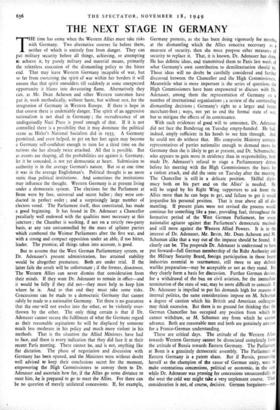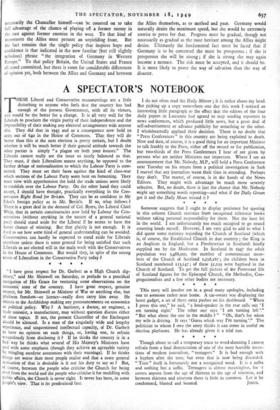THE NEXT STAGE IN GERMANY
THE time has come when the Western Allies must take risks with Germany. Two alternative courses lie before them, neither of which is entirely free from danger. They can put military security before all things, achieving, or attempting to achieve it, by purely military and material means, primarily the relentless execution of the dismantling policy to the bitter end. That may leave Western Germany incapable of war, but so far from exorcising the spirit of war within her borders it will ensure that that spirit smoulders till suddenly at some unexpected opportunity it blazes into devastating flame. Alternatively they can, as Mr. Dean Acheson and other Western statesmen have put it, work methodically, without haste, but without rest, for the integration of Germany in Western Europe. If there is hope in that course there is undeniably danger. The spirit of an aggressive nationalism is not dead in Germany ; the recrudescence of an undisguisedly Nazi Press is proof enough of that. If it is not controlled there is a possibility that it may dominate the political scene as Hitler's National Socialists did in 1933. A Germany permitted, and even helped, to get on her feet again may become a Germany self-confident enough to turn for a third time on the nations she has already twice attacked. All that is possible. But as events arc shaping, all the probabilities arc against it. Germany, let it be conceded, is not yet democratic at heart. Submission to authority is in the average German's nature. But so at one time it was in the average Englishman's. Political thought is no more static than political institutions. And sometimes the institutions may influence the thought. Western Germany is at present living under a democratic system. The elections for the Parliament at Bonn were by free, universal and secret ballot ; they were con- ducted in perfect order ; and a surprisingly large number of electors voted. The Parliament itself, thus constituted, has made a good beginning. It has found in Dr. Adenauer a Chancellor peculiarly well endowed with the qualities most necessary at this juncture ; the Chamber is working, if not on a strictly two-party basis, at any rate untrammelled by the mass of splinter parties which cumbered the Weimar Parliaments after the first war, and with a strong and compact opposition under an able, if too bitter, leader. The promise, all things taken into account, is good.
But to assume that the West German Parliamentary system, or Dr. Adenauer's present administration, has attained stability would be altogether premature. Both are under trial. If the latter fails the result will be unfortunate ; if the former, disastrous. The Western Allies can never dismiss that consideration from their minds. If they want Dr. Adenauer to remain in office—and it would be folly if they did not—they must help to keep him where he is. And to that end they must take some risks. Concessions can be made to a democratic Germany that cannot safely be made to a nationalist Germany. Yet there is no guarantee that the one'will not evolve into the other, or be violently over- thrown by the other. The only thing certain is that if Dr. Adenauer cannot secure the fulfilment of what the Germans regard as their reasonable aspirations he will be displaced by someone much less moderate in his policy and much more violent in his methods. That is the situation the Allied Ministers have had to face, and there is every indication that they did face it at their recent Paris meeting. There cannot be, and is not, anything like flat dictation. The phase of negotiation and discussion with Germany has been opened, and the Ministers were without doubt well advised to keep their conclusions secret for the moment, empowering the High Commissioners to convey them to Dr. Adenauer and ascertain how far, if the Allies go some distance to meet him, he Is prepared to go to meet the Allies. For there can be no question of merely unilateral concessions. If, for example, Germany protests, as she has been doing vigorously for months, at the dismantling which the Allies conceive necessary as a measure of security, then she must propose other measures of security to replace it. That, it is known, Dr. Adenauer has done, He has definite ideas, and transmitted them to Paris last week. of what Germany's own contribution to demilitarisation should be. Those ideas will no doubt be carefully considered and further discussed between the Chancellor and the High Commissioners. Meanwhile what is more important is the series of questions the High Commissioners have been empowered to discuss with Dr. Adenauer, among them the representation of Germany on a number of international organisations ; a review of the outstanding dismantling decisions ; Germany's right to a larger and better merchant-fleet ; ways, not yet to end the formal state of war, but to mitigate the effects of its continuance.
With such evidences of good will to announce, Dr. Adenauer did not face the Bundestag on Tuesday empty-handed. He had. indeed, amply sufficient in his hands to see him through. And he could not do without that. His composite Ministry contains representatives of parties nationalist enough to demand more for Germany than she is likely to get at present, and Dr. Schumacher. who appears to gain more in stridency than in responsibility, both made Dr. Adenauer's refusal to stage a Parliamentary debate before his meeting with the High Commissioners the basis for a violent attack, and did the same on Tuesday after the meeting. The Chancellor is still in a delicate position. Skilful diplo- macy both on his part and on the Allies' is needed. He will be urged by his Right Wing supporters to ask from the Allies more than he can hope to get, and failure to get it would jeopardise his personal position. That is true above all of dis- mantling. If present plans were not revised the process would continue for something like a year, providing fuel, throughout the formative period of the West German Parliament, for every nationalist agitator against that Parliament's democratic methods and still more against the Western Allied Powers. It is in the interest of Dr. Adenauer, Mr. Bevin, Mr. Dean Acheson and N. Schuman alike that a way out of the impasse should be found. It clearly can be. The proposals Dr. Adenauer is understood to hare put forward—full German membership of the Ruhr Authority and the Military Security Board, foreign participation in those heavy industries essential to rearmament, still more to any definite warlike preparation—may be acceptable or not as they stand. Bu: they clearly form a basis for discussion. Further German desires, for a withdrawal of the ban on civil aviation, for the immediate termination of the state of war, may be more difficult to concede. If Dr. Adenauer is impelled to put his demands high for reasons of internal politics, the same considerations impose on M. Schuman a degree of caution which his British and American colleagues may think excessive. But there is no ground for thinking that the German Chancellor has occupied any position from which he cannot withdraw, or M. Schuman any from which he cannot advance. Both are reasonable men and both are genuinely anxious for a Franco-German understanding.
These are critical days. The attitude of the Western Allies towards Western Germany cannot be dissociated completely from the attitude of Russia towards Eastern Germany. The Parliament at Bonn is a genuinely democratic assembly. The Parliamemof Eastern Germany is a patent sham. But if Russia, presenting herself as the champion of the cause-of German unity, were to make ostentatious concessions, political or economic, in the cast while Dr. Adenauer was pressing for concessions unsuccessfully in the west the cold war might take a very unpleasant course. That consideration is not, of course, decisive. German bargainers—net necessarily the Chancellor himself—can be counted on to take full advantage of the chance of playing off a former enemy in the east against former enemies in the west. To that kind of manoeuvre the Allies must present an unyielding front. But the fact remains that the single policy that inspires hope and confidence is that indicated in the now familiar (but still slightly nebulous) phrase " the integration of Germany in Western Europe." To that policy Britain, the United States and France all stand committed, but there is room for considerable differences of opinion yet, both between the Allies and Germany and between the Allies themselves, as to method and pace. Germany would naturally desire the maximum speed, but she would be extremely unwise to press for that. Progress must be gradual, though not necessarily as gradual as the most hesitant among the Allies might desire. Ultimately the fundamental fact must be faced that if Germany is to be contented she must be prosperous ; if she is prosperous she will be strong ; if she is strong she may again become a menace. The risk must be accepted, and it should be. It is more likely to prove the way of salvation than the way of disaster.















































































 Previous page
Previous page